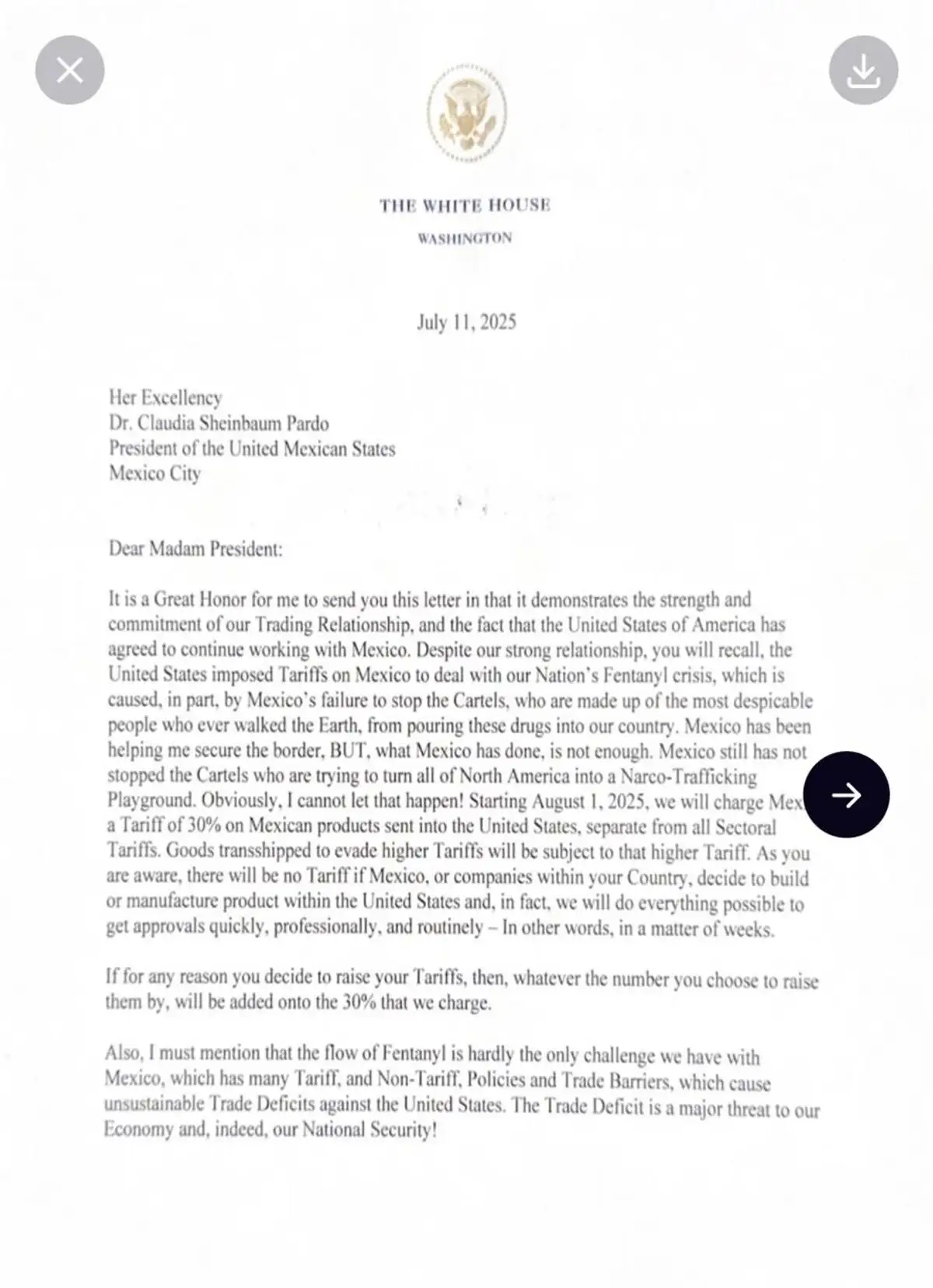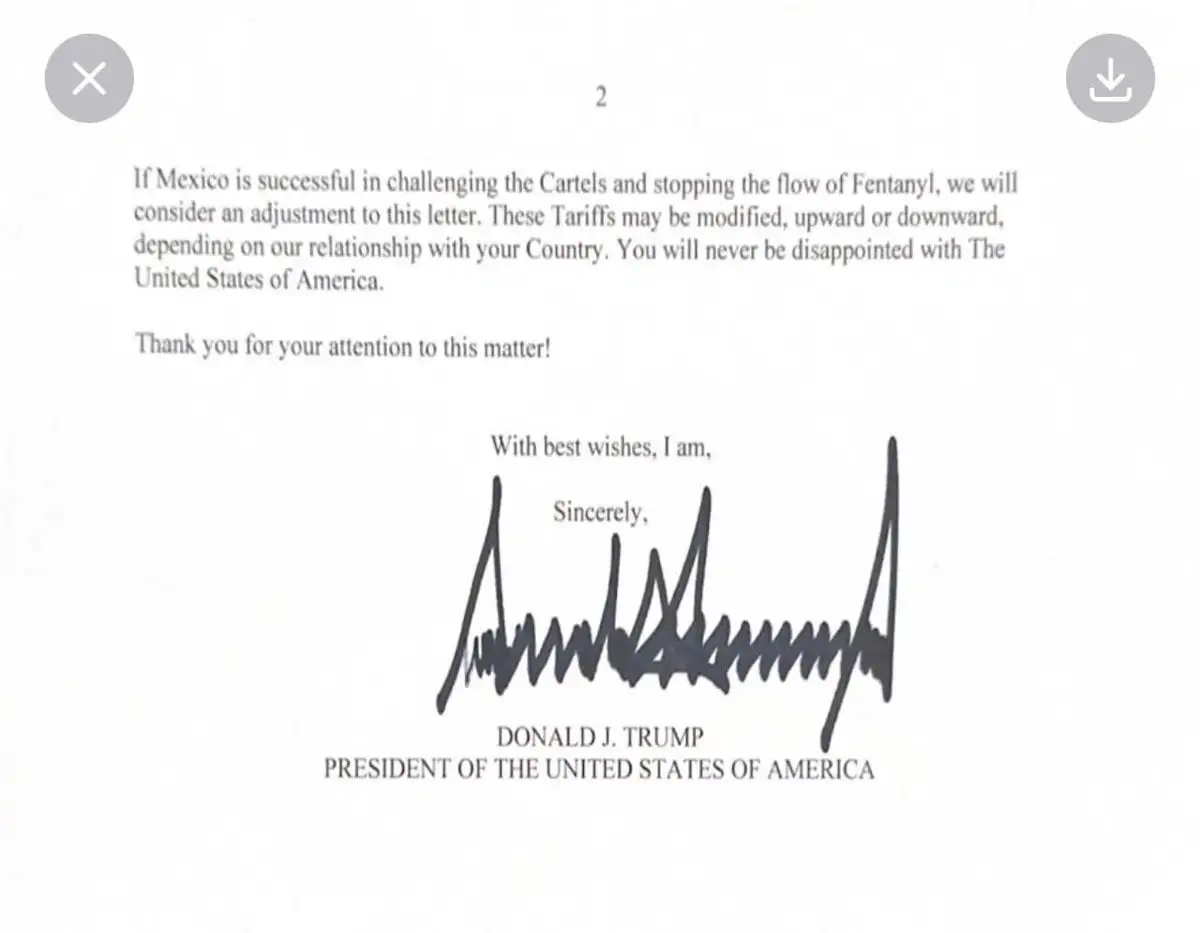Mexico City. The president of the United States, Donald Trump, announced this Saturday that starting August 1, he will impose tariffs of 30 percent on all products of Mexican origin, as he considered that Mexico is not doing enough in the fight against drug trafficking, but argued that his country maintains a deficit in the trade relationship that is a"threat" to the national security of the United States.
Through his social media platform, Truth Social, the U.S. president released a letter addressed to Mexican President Claudia Sheinbaum Pardo, recognizing her efforts to secure the border between the two countries.
“What Mexico has done is not enough. Mexico has not yet stopped the cartels trying to turn all of North America into a drug trafficking park. Obviously, I cannot allow that to happen!” Trump said.
Given this situation, he indicated that starting August 1, the United States will impose a 30 percent tariff on Mexican products shipped to the United States, in addition to all sector-specific tariffs.
This translates into new tariffs that will be applied to all products, even if they are covered by the USMCA. However, it also means that goods such as automobiles, auto parts, aluminum, and steel will have to pay an additional tax, as all of them have already been subject to tariffs in recent months.
"Goods shipped to evade higher tariffs will be subject to those higher tariffs," the U.S. president noted.
In his letter, Trump recalled that his administration imposed tariffs on Mexico to address the fentanyl crisis in that nation, which he said was fueled by a lack of action to stop"the cartels, who are comprised of the most despicable people to ever walk the Earth, from bringing these drugs into our country."
Trump indicated that no tariffs will be levied if companies based in Mexico decide to build or manufacture products within the United States."We will do everything possible to obtain approvals quickly, professionally, and routinely. In other words, within weeks," he said.
The US president clarified that drug trafficking is not the only reason he has decided to impose 30 percent tariffs starting August 1, but also because the United States has a trade deficit with Mexico, something he considered"unsustainable." Earlier this month, the US Census Bureau reported that Mexican exports increased to a historic high in May, and that Mexico remained the country's main trading partner (https://tinyurl.com/3ezpbu9k).
"The trade deficit is a significant threat to our economy and, indeed, to our national security," he stressed.
Trump threatened that if Mexico decides to respond with reciprocal tariffs—that is, impose 30 percent tariffs on sensitive products—he will add another 30 percent to products of Mexican origin.

Letter Donald Trump published dedicated to Claudia Sheinbaum, president of Mexico. Via Truth Social

Letter that Donald Trump published dedicated to Claudia Sheinbaum, president of Mexico. Via Truth Social
However, he also commented that if the federal government stops the flow of fentanyl and other drugs to the United States, the tariffs will be adjusted. “If Mexico is successful in challenging the cartels and stopping the flow of fentanyl, we will consider adjusting this charter. These tariffs may be modified, up or down, depending on our relationship with your country. You will never be disappointed in the United States of America,” he noted.
This new announcement comes despite the fact that a Mexican government delegation arrived on Friday to continue negotiations on tariffs, including those sought on copper. In that regard, the federal government announced this Saturday that it is already in negotiations.
This also occurs despite the fact that President Sheinbaum Pardo spoke with Trump on June 17, in which they agreed to work to reach a"prompt agreement" on several issues of concern to both nations.
A meeting between the two leaders was scheduled days earlier in the context of the G7 meeting in Canada, but the US president returned to his country to address the Middle East conflict.
In May, they also held another telephone conversation, in which they discussed steel and aluminum tariffs, but also highlighted the preferential treatment given to auto exports at the time.
